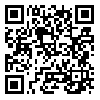BibTeX | RIS | EndNote | Medlars | ProCite | Reference Manager | RefWorks
Send citation to:
URL: http://tumj.tums.ac.ir/article-1-7464-en.html

 , Farahnaz Mohammadi Shahboulaghi2
, Farahnaz Mohammadi Shahboulaghi2 
 , Fatemeh Nayeri3
, Fatemeh Nayeri3 
 , Hosein Dalili4
, Hosein Dalili4 
 , Mamak Shariat *
, Mamak Shariat * 
 5
5
2- Social Determinants of Health Research Center, Department of Nursing, University of Social Welfare and Rehabilitation Sciences, Tehran, Iran.
3- Maternal, Fetal and Neonatal Research Center, Tehran University of Medical Sciences, Tehran, Iran.
4- Breastfeeding Research Center, Tehran University of Medical Sciences, Tehran, Iran.
5- Maternal, Fetal and Neonatal Research Center, Tehran University of Medical Sciences, Tehran, Iran. ,
|
Background: In fact, there is no doubt that medical education should be to prepare students for those clinical problems that they may encounter in their future performance. But according to the findings of previous studies in this area, one of the important priority and basic needs in education is training health workers, including physicians. Methods: In this qualitative study focuses on the content analysis of typical (conventional content analysis) was performed. The aim of this study was to determine the needs and skills required to train neonatal subspecialists in the ability to manage vulnerable neonates problems and their families specialized in the field of comprehensive health care have driven. Based on purposive sampling, the research participants, staff and alumni of the second year and above the five-year sub-specialty in neonatology, formed by the association of neonatal diseases were chosen. Saturation as a termination criterion was applied to the collected data. Method of data collection was semi-structured interviews and focus group discussions. Reliability means the adequacy and accuracy that was measured by four methodological criteria: credibility, confirmability, transferability and dependability. All phases of study were recorded elaborately and the researchers reported all findings in the same speech research participants. Results: Respondents consider themselves some week points in neonatal medicine education; they expressed their opinions in three categories with four subcategories as follow: "competent person knowledgeable", "weakness of the curriculum", "educational challenges", "need to review the curriculum", "the need to reform medical education system in the country", and "effective strategies for teaching". Conclusion: Editing curriculum to teach coherent and comprehensive clinical skills in one hand, social support and health care for vulnerable children and families in other hand will improve care for vulnerable neonates. |
| Rights and permissions | |
 |
This work is licensed under a Creative Commons Attribution-NonCommercial 4.0 International License. |



